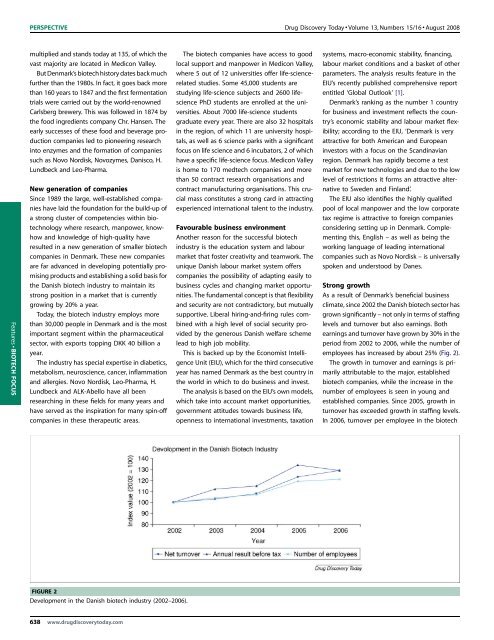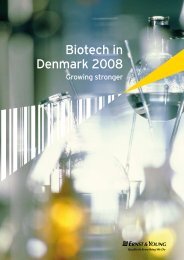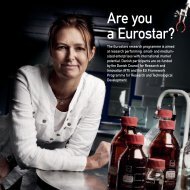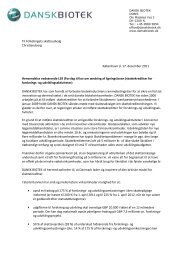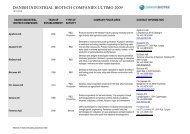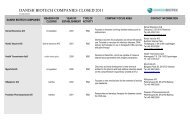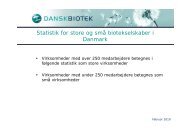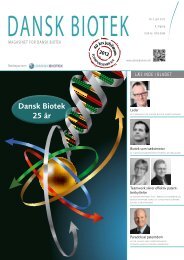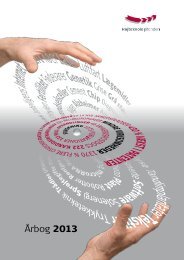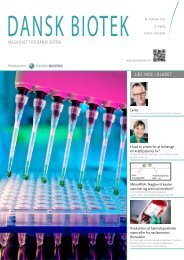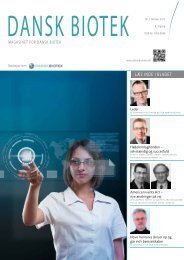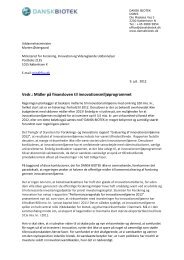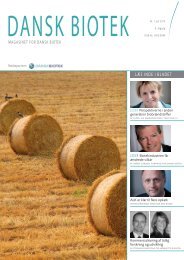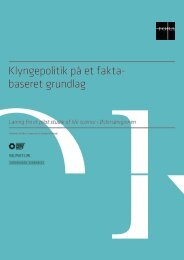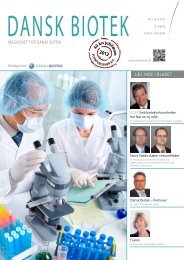You also want an ePaper? Increase the reach of your titles
YUMPU automatically turns print PDFs into web optimized ePapers that Google loves.
PERSPECTIVE Drug Discovery Today Volume 13, Numbers 15/16 August 2008<br />
Features BIOTECH FOCUS<br />
multiplied and stands today at 135, of which the<br />
vast majority are located in Medicon Valley.<br />
But Denmark’s <strong>biotech</strong> history dates back much<br />
further than the 1980s. In fact, it goes back more<br />
than 160 years to 1847 and the first fermentation<br />
trials were carried out by the world-renowned<br />
Carlsberg brewery. This was followed in 1874 by<br />
the food ingredients company Chr. Hansen. The<br />
early successes of these food and beverage production<br />
companies led to pioneering research<br />
into enzymes and the formation of companies<br />
such as Novo Nordisk, Novozymes, Danisco, H.<br />
Lundbeck and Leo-Pharma.<br />
New generation of companies<br />
Since 1989 the large, well-established companies<br />
have laid the foundation for the build-up of<br />
a strong cluster of competencies within <strong>biotech</strong>nology<br />
where research, manpower, knowhow<br />
and knowledge of high-quality have<br />
resulted in a new generation of smaller <strong>biotech</strong><br />
companies in Denmark. These new companies<br />
are far advanced in developing potentially promising<br />
products and establishing a solid basis for<br />
the Danish <strong>biotech</strong> industry to maintain its<br />
strong position in a market that is currently<br />
growing by 20% a year.<br />
Today, the <strong>biotech</strong> industry employs more<br />
than 30,000 people in Denmark and is the most<br />
important segment within the pharmaceutical<br />
sector, with exports topping DKK 40 billion a<br />
year.<br />
The industry has special expertise in diabetics,<br />
metabolism, neuroscience, cancer, inflammation<br />
and allergies. Novo Nordisk, Leo-Pharma, H.<br />
Lundbeck and ALK-Abello have all been<br />
researching in these fields for many years and<br />
have served as the inspiration for many spin-off<br />
companies in these therapeutic areas.<br />
The <strong>biotech</strong> companies have access to good<br />
local support and manpower in Medicon Valley,<br />
where 5 out of 12 universities offer life-sciencerelated<br />
studies. Some 45,000 students are<br />
studying life-science subjects and 2600 lifescience<br />
PhD students are enrolled at the universities.<br />
About 7000 life-science students<br />
graduate every year. There are also 32 hospitals<br />
in the region, of which 11 are university hospitals,<br />
as well as 6 science parks with a significant<br />
<strong>focus</strong> on life science and 6 incubators, 2 of which<br />
have a specific life-science <strong>focus</strong>. Medicon Valley<br />
is home to 170 medtech companies and more<br />
than 50 contract research organisations and<br />
contract manufacturing organisations. This crucial<br />
mass constitutes a strong card in attracting<br />
experienced international talent to the industry.<br />
Favourable business environment<br />
Another reason for the successful <strong>biotech</strong><br />
industry is the education system and labour<br />
market that foster creativity and teamwork. The<br />
unique Danish labour market system offers<br />
companies the possibility of adapting easily to<br />
business cycles and changing market opportunities.<br />
The fundamental concept is that flexibility<br />
and security are not contradictory, but mutually<br />
supportive. Liberal hiring-and-firing rules combined<br />
with a high level of social security provided<br />
by the generous Danish welfare scheme<br />
lead to high job mobility.<br />
This is backed up by the Economist Intelligence<br />
Unit (EIU), which for the third consecutive<br />
year has named Denmark as the best country in<br />
the world in which to do business and invest.<br />
The analysis is based on the EIU’s own models,<br />
which take into account market opportunities,<br />
government attitudes towards business life,<br />
openness to international investments, taxation<br />
systems, macro-economic stability, financing,<br />
labour market conditions and a basket of other<br />
parameters. The analysis results feature in the<br />
EIU’s recently published comprehensive report<br />
entitled ‘Global Outlook’ [1].<br />
Denmark’s ranking as the number 1 country<br />
for business and investment reflects the country’s<br />
economic stability and labour market flexibility;<br />
according to the EIU, ‘Denmark is very<br />
attractive for both American and European<br />
investors with a <strong>focus</strong> on the Scandinavian<br />
region. Denmark has rapidly become a test<br />
market for new technologies and due to the low<br />
level of restrictions it forms an attractive alternative<br />
to Sweden and Finland’.<br />
The EIU also identifies the highly qualified<br />
pool of local manpower and the low corporate<br />
tax regime is attractive to foreign companies<br />
considering setting up in Denmark. Complementing<br />
this, English – as well as being the<br />
working language of leading international<br />
companies such as Novo Nordisk – is universally<br />
spoken and understood by Danes.<br />
Strong growth<br />
As a result of Denmark’s beneficial business<br />
climate, since 2002 the Danish <strong>biotech</strong> sector has<br />
grown significantly – not only in terms of staffing<br />
levels and turnover but also earnings. Both<br />
earnings and turnover have grown by 30% in the<br />
period from 2002 to 2006, while the number of<br />
employees has increased by about 25% (Fig. 2).<br />
The growth in turnover and earnings is primarily<br />
attributable to the major, established<br />
<strong>biotech</strong> companies, while the increase in the<br />
number of employees is seen in young and<br />
established companies. Since 2005, growth in<br />
turnover has exceeded growth in staffing levels.<br />
In 2006, turnover per employee in the <strong>biotech</strong><br />
FIGURE 2<br />
Development in the Danish <strong>biotech</strong> industry (2002–2006).<br />
638 www.drugdiscoverytoday.com


